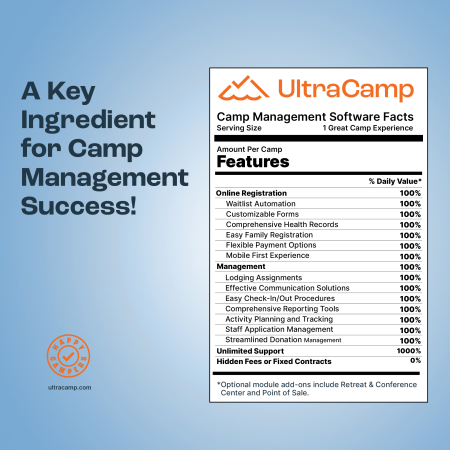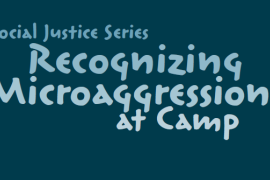For far too long, justice, equity, diversity, and inclusion (JEDI) efforts have been pushed to the sidelines, often treated as separate initiatives rather than an essential strategy embedded into the fabric of our organizational mission and programming. It’s time to shift this paradigm and recognize that our JEDI strategy isn’t just a parallel endeavor but a necessary part of our core mission and success metrics.
Since the summer of 2020, following the murder of George Floyd, there has been a noticeable surge in the commitment to JEDI across the United States, and the camp world was a part of this national shift. This pivotal moment in global consciousness spurred many organizations within the camp community to take a hard look internally and reevaluate their approach to JEDI, recognizing the urgency to address not only surface-level discrimination, but also systemic inequalities.
This wave of enthusiasm launched numerous initiatives. Experts in the field offered workshops and training opportunities, and policies were assessed and amended — all with the hope of fostering a more inclusive environment. However, despite this initial call to action and well-meaning intentions, it is clear now that sustaining these JEDI efforts and effecting long-term systemic change over short-term individual shifts is a much more complex and enduring task than initially anticipated. There must be more.
As the years have passed, a pattern has emerged: many of those well-intentioned JEDI attempts have fallen short and, as a result, organizational staff experience “DEI fatigue.” This occurs when individuals or organizations initially energized and committed to diversity, equity, and inclusion (DEI) efforts face obstacles that lessen their enthusiasm and impede continued progress. Instead, there is a divestment due to lack of success or a shift in focus to other priorities.
However, those most marginalized suffer the consequences of this fatigue — of failed efforts to provide both equity and psychological safety in the workplace. Those in power must recognize this work is not a quick fix but a long-term commitment that calls us to participate and put in continuous effort toward these goals. And release from the fleeting allyship of committing to JEDI only when it is front and center on the national stage.
Like many organizations in various sectors, many camps jumped into action with limited strategy and conducted sporadic training sessions or implemented surface-level JEDI policies without addressing underlying systemic issues. It’s crucial to acknowledge that sustaining JEDI efforts requires more than just short-term enthusiasm. It demands a sustained, multifaceted approach that involves consistent commitment from leadership, active participation and buy-in from all organization members, ongoing education, and a willingness to adapt strategies based on continuous evaluation and feedback.
To prevent these initiatives from faltering, we need to reframe the narrative and approach. We must shift our language of initiatives to that of strategy. Shifting from initiatives to a strategic framework in our approach to justice, equity, diversity, and inclusion is pivotal to prevent the failure of these transformative efforts. While initiatives may convey a sense of short-term projects or singular efforts, a strategic approach implies a holistic and continuous commitment ingrained within the organization’s very fabric. Initiatives imply that they can be easily halted or changed based on fluctuations in leadership priorities or budget constraints. They might lack the depth and sustained investment necessary to create lasting change. On the other hand, embracing JEDI as a strategic imperative signals a more profound commitment — one that includes financial investment, the integration of strategic goals into every facet of operations, and ongoing evaluation and adaptation with feedback from those most directly affected.
To infuse JEDI into our core operations in the workplace, it is vital that we first take a look inward at our practices that could impede our efforts’ success. What many camps see as obstacles includes the difficulty to commit to JEDI initiatives when things get too busy or when camps are understaffed — and some are unable to visualize success without stated deliverables. So we need to start the conversation about the impact of a lack of operationalized JEDI practices. The willingness to improve can ignite hope, and many camps and other organizations only need the tools.
JEDI goals belong in our organizational strategic plan. If we don’t include our JEDI strategy within our organizational strategic plan, we lose the opportunity to truly center it in our work. If it is included, there is the opportunity to tie these goals to our budgets. As a general rule, strategic goals that have a budget tied to them are invested in not only financially, but also with:
- Resources
- Staffing
- Evaluation metrics
- Organizational buy-in
- A measured timeline
Most importantly, there is a sense of accountability on the organizational level to its ultimate success.
We see this within our own organization’s yearly and multiyear strategic plans and know one way we can operationalize our JEDI practice is to include it in our job descriptions as part of every role’s work. When we understand the concepts of JEDI and how they are practiced in real time, outside of theory, it is apparent that our work is intimately intertwined.
Many of us feel bogged down with other priorities like camper safety or speaking to caregivers, as well as training and mentoring staff. But isn’t DEI core to the success of all of these job duties? How can we truly ensure camper safety without having an intimate knowledge of how an individual’s marginalized identity impacts their psychological safety? How can we ensure that the language we use with our caregivers is truly inclusive of all families and identities so we maintain positive relationships with one of our largest stakeholders? Or how can we truly train staff effectively without preparing them to think about equity and inclusion and being active accomplices in addressing actions such as implicit bias and microaggressions, not only between youth but from other staff and leadership? JEDI is integral to the success of our programs.
If we decide as an organization that this work is everyone’s, then senior leadership must build the necessary structures to make it sustainable, for example:
- Offering financial incentives
- Providing flex time so those expected to lead frontline JEDI work can truly invest in the process
- Including evaluative measures to keep leaders accountable to the success of these strategies
Lastly, before we begin, as leaders we must accept and enable the shift in power dynamics within our organizations and address our own social identity and position. This is integral to the work moving forward, but senior leaders often can be the biggest barrier to progress. To truly operationalize JEDI practices into our work means that we must set the foundation for transformation in our systems and structures and move beyond individual changes in behavior and language.
Embedding JEDI into the very fabric of our organizations is what will transform the camp industry. If we no longer see JEDI as something to temporarily invest in or as a siloed goal, we will move closer to providing the life-changing experiences we promise to our campers, families, and communities. This all-in investment provides such opportunities for all campers and not just some. Isn’t that what we are all here for?
Photos courtesy of Camp Wright, Kent Island, MD; Wildwood Outdoor Education Center, LaCygne, KS; Camp Harbor View, Quincy, MA; Camp Wood YMCA, lmdale, KS; Association of Horizon, Hudson, IL; Camp Howe, Goshen, MA.
Simone Gamble (they/them) is the founder of OAAARS, a community of consultants of color that offers social justice-centered training to create safer, inclusive workplaces to cultivate agents of change in the workplace and beyond. Simone spent over 10 years in camp roles ranging from counselor to assistant camp director.





